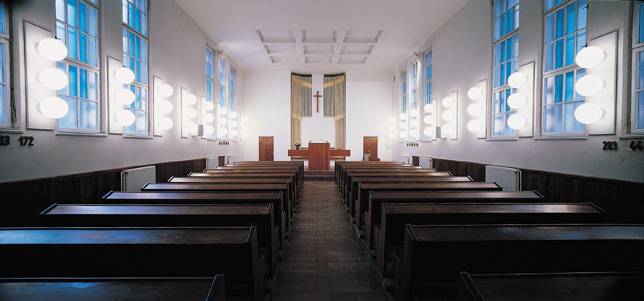Parish congregation of Prague 10 – Strašnice
By the occassion of 70th anniversary of opening the Congregational House issues a publication named
THE PLACE WHEREON THOU STANDEST


The year 1930 saw the construction of the house our congregation is based in. The seventieth anniversary of that event does not mark a pivotal event in the life of our Protestant congregation. But it does provide an occasion to look back at the roots from which the life of today's congregation grew up, and at the same time an opportunity to look forward and thus to maintain in the future the continuity of positive elements while discarding unnecessary ballast.
The beginnings of the congregation in Strašnice are to be found in work with children that started in 1921 and in the establishment of a preaching outpost in 1923. The establishment of a congregation was not intended to be simply the formal constitution of a legal entity; it was meant to mark the start of properly developed life in the fields of proclaiming the Word, mission, and diaconal work. And so the representatives of the preaching outpost at the time decided to build a house which would make this activity possible in a practical way, before formally establishing a congregation. In 1930 a four-storey house was constructed, with a chapel looking onto the yard, a choir on the mezzanine floor that could be used independently, rooms that could be used for the administrative needs of the congregation, and apartments for those working in the congregation and for other tenants. The sober constructivist style, in its simplicity, concentrates our attention on the essential: on proclaiming the Word and on fellowship. After the purchase of further plots of land, the chapel was extended in 1934. The building underwent wide-ranging alterations at the beginning of the 1990s. The reconstruction primarily concerned the chapel (floor, heating, the appearance of the facade, reconstruction of the organ) and the other rooms used by the congregation, but in its later stages it also affected the residential part of the building, with the replacement of all the mains distribution networks in the apartments.
This house thus became an excellent base for the life of the congregation. Two years after the formal establishment of the congregation in 1937, the first pastor, Lubomír Balcar, was appointed (1939). After his death in 1968 his work was continued by Jioí Lejdar, and then by Pavel Klinecký in 1993. The preachers in Strašnice were able to work with all the different generations, and helped train a number of theologians. Various artistic activities flourished in the congregation, as can be seen from the pictures, sculptures, poetry and prose created by Protestants from Strašnice that are reproduced in this book. The diaconal element in the life of the church was represented right from the start of the congregation's existence by the work of the women in the Christian Service organisation, and in recent years by cooperation with the Ratolest (sprig) centre run by the Diakonie organisation.
Naturally enough, the history of the congregation has been shaped to a considerable extent by external circumstances. The very foundation of our church in 1918 was so heavily influenced by the periods that preceded it that it is difficult to avoid the conviction that the true beginnings of the Evangelical Church of Czech Brethren are to be found in the Tolerance era or even earlier in the period after the Battle of the White Mountain. The Second World War and the forty years of totalitarianism that followed it not only reduced the possibilities open to the church, but aimed at liquidating it entirely. But this external pressure also led to a certain concentration of the life of the church around its true centre. We can see the future of the church as consisting in a space marked by the basic principles of the Bible, and by the peace, hope, and encouragement to lead an active life in the face of current dangers, that arise out of those principles.
"A community that is based on these principles, built up from below, supported by the members of the church, by the presbyters and other lay members, has hope even in the midst of today's secularised European society, which is often regarded and talked of as being unhealthy and as coming to the end of its existence. But our task remains: to bring the Gospel to all nations. To our nation, too, a nation that once loved the Truth of Christ to the extent that we were ready to risk our own lives. What kind of nation is it today? Is it really a nation that refuses to listen? (...) Or is there still a space in the lives of people who have drifted away from the church, a space that is waiting to be filled by the true Gospel, by the hope that gives us strength to live our lives and that opens up the future?" (From the conclusion of the article "The length of our days is seventy years" by Pavel Smetana, Moderator of the Evangelical Church of Czech Brethren, pp. 36ff.)
